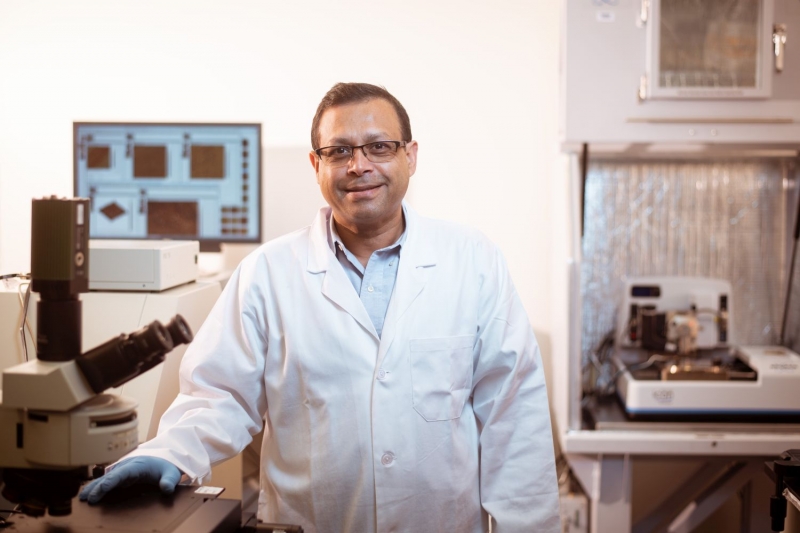Alamgir Karim, the Dow Chairman and Welch Foundation professor of the William A. Brookshire Department of Chemical and Biomolecular Engineering at the Cullen College of Engineering, has seen the potential of block copolymer when it comes to dealing with some of the impending crises of the next century, whether the issue is climate change, water shortages or materials engineering for nanotechnology and energy.
“Block copolymer is potentially a key component in solving some of these problems in my mind, because of the versatility of what you can do with it and the structures you can create with it,” he said. “They can be templates for transistor chips to membranes for water filtration and energy storage. We were the first to show that highly ordered block copolymers can act as solid state energy storage devices for flexible devices. Whether the goal is to cut down on global and CO2 emissions, or energy management, you need a lot of baseline nanotechnologies to enable sustainability. And block copolymers can provide potential solutions.”
Karim's work has achieved further recognition nationally, as the National Science Foundation announced that he has earned the Special Creativity Award. The honor comes with an additional two years of enhanced support for his NSF grant, “Ordering of Block Copolymer Systems with Enhanced Molecular Interactions and Diffusional Dynamics.”
“I've been working on this particular grant for two years, but in the general area of block copolymer self-assembly, it's pretty much my career for at least the last two decades,” Karim said. “I believe this award is recognition for a pair of very important papers resulting from that research.”
According to Triantafillos “Lakis” Mountziaris, William A. Brookshire Department Chairman, the NSF acknowledged Karim for “excellent research, productivity, and impact in the area of directed assembly and ordering of block copolymer systems with enhanced molecular interactions, as well as the broader impacts emanating from his NSF project.”
“It was excitement and jubilation,” Karim said of his thoughts when he was notified that he had won the award. “Most importantly though, I felt it was recognition for work that I thought was important in the field of nanotechnology. It would give an opportunity for my academic colleagues to recognize that this was important work.”
Karim's research focuses on using ionic liquids (IL) to create self-processing chains in block polymer films. The NSF grant and award related to the use of these non-volatile ionic liquids for highly efficient solution processing to obtain versatile morphologies for block copolymer nanotechnology, rather than energy intensive thermal annealing, which is advantageous. For example, using them in an industrial process could reduce the number of steps needed to be done – an automatic chemical process could take the place of a machine process that heats up a material to a liquid form. Using this newly developed IL based block copolymer processing strategy, efficiencies can be obtained throughout the manufacturing process, ideally.
In his department, Karim said he collaborates closely with Megan Robertson, an Associate Professor, as well as Ramanan Krishnamoorti, Professor of Petroleum Engineering and Chemistry. He also cited Jeremy Palmer, Ernest J. and Barbara M. Henley Associate Professor, and Jacinta Conrad, the Frank M. Tiller Professor, as experts he consults with regularly, on physics theories and colloids respectively.
Outside of his department, Karim said Hadi Ghasemi, an Associate Professor in Mechanical Engineering that specializes in coatings, was someone he worked with, as well as Haleh Ardebili, Bill D. Cook Professor of Mechanical Engineering, on polymers for flexible gel electrolyte batteries. Karim was also interested in exploring research partnerships with T. Randall Lee and Eva Harth of UH's Department of Chemistry.
Karim, who also serves as director of the International Polymer & Soft Matter Center (IPSMC), and the director of the Materials Engineering Program, first came to the University of Houston in 2017. He was previously a professor at the University of Akron for eight years, and a researcher at the National Institute of Standards and Technology (NIST) for 15 years. His research group now includes about 20 students.
“Having good students is key to making good progress,” he said. “The Chemical Engineering Department here, we get some of the world's most outstanding student applications. That makes a big difference. The quality of the student matters.”
Karim also brings in professionals from industry to help. One example he cited was Patrick Brant, Ph.D., a private consultant now, but who served as Chief Polymer Science Advisor at ExxonMobil for more than seven years, and Chief Scientist there for more than 11 years.
“He's a real expert in polymer synthesis, so now that he's retired, he works in my lab part-time sort of training students in fundamental studies of different kinds of semi-crystalline polyolefin polymers that are commercially important,” Karim said. “He's working in my lab, mentoring my students, so that's great. I would really say that this area, in particular, we have so many amazing retired people from the polymer industry and the petrochemical industry. If they want to work with people at the university, we'd love to get their help.”
